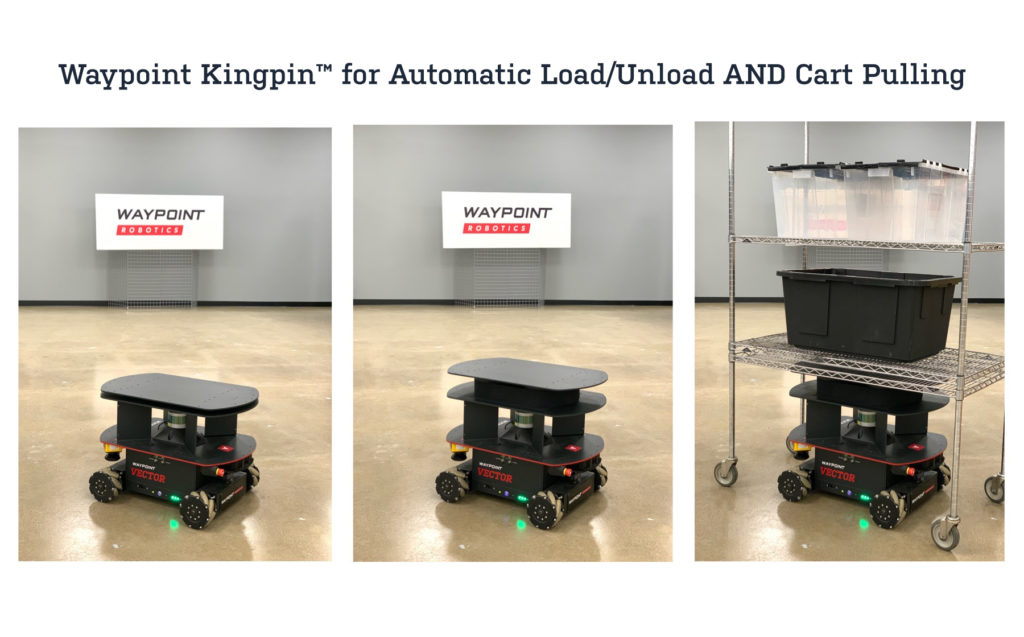ATLANTA — Waypoint Robotics Inc. was among the companies that made announcements at MODEX here yesterday. The mobile robot provider has expanded its offerings for materials handling in factories and distribution centers.
Currently, most order-fulfillment operations are manual, wasting staff time and effort walking across facilities when human efforts could be better spent on other tasks, according to Waypoint.
Waypoint Robotics’ Vector and MAV3K autonomous mobile robots (AMRs) are designed to be easy to set up and use. The Nashua, N.H.-based company, which was on the 2019 RBR50 list of robotics leaders, is displaying its offerings in Booth 9600 at MODEX.
Numina Group brings batch order fulfillment to partnership
Woodridge, Ill.-based Numina Group last week said that it has integrated its RDS Batch Bot real-time distribution software with Waypoint Robotics’ Vector AMR. It coordinates people, robots, and payloads.
The company has experience in real-time software for OEMs, and it found a natural fit with Waypoint’s heavy-duty AMRs based on the Robot Operating System (ROS), said Dan Hanrahan, CEO of Numina Group, at a press conference.
“A couple of years ago, this technology didn’t exist, and now we have optimized movement, simulation for testing, and closed-loop, pick and pack validation,” he told The Robot Report. “By putting the intelligence on the robots without having to go to the cloud, it reduces the cost of ownership. It’s a $1 million solution for a distribution center rather than a $100 million.”
The RDS automation module uses pick-by-voice commands to direct operator zone movement and picking tasks while coordinating Vector batch cart movement throughout a distribution center.
“The Batch Bot module includes order release and prioritization, cartonization pick to carton, put to light order consolidation, and labor- and order-tracking performance metrics reporting,” Hanrahan stated.
The companies said their joint offering can reduce labor costs by 40% in comparison with a purely manual cart-picking process.

Waypoint’s Kingpin loads and unloads
Waypoint Robotics said its Kingpin top module enables its omnidirectional AMRs to pick up and move carts so that human operators can focus on high-value order picking, resulting in higher efficiency.
With Kingpin, Vector can automatically pick up a tote on one side of a factory, deliver it to the other side, and then connect to a cart on the way back to the starting point, said the company. Vector has a 600-lb. payload capacity, and MAV3K has a 3,000-lb. capacity. MAV3K is now available, said Waypoint.
“Waypoint’s Kingpin is the first of its kind, dual-use module that enables Vector and MAV3K AMRs to automatically load and unload payloads, as well as hitch and transport carts of all sizes,” stated Jason Walker, CEO of Waypoint Robotics. “Now you don’t have to dedicate a robot for one task or another. With Kingpin, you can do both.”
“This, combined with Numina Group’s RDS order-fulfillment automation suite, creates a powerful but easy-to-use solution to improve worker productivity and safety by reducing the heavy lifting,” he added. “Our systems can be deployed in hours and are designed for integration and scalability.”
Kingpin is part of a series of “crowns,” or customizable top modules, for Waypoint’s robots, extending their utility from warehouses into logistics with support from Numina’s software, said Walker. Both MAV3K and Vector include dynamic weight sensing for improved traction while changing payloads, self-charging via the EnZone wireless dock, and redundant sensors and safety systems.
The codes on carts also enable carts and payloads to be tracked, and RDS links with warehouse management and inventory systems, Walker noted.

Use case for Waypoint Robotics and Numina
The physical stress of pushing heavy carts was causing people to quit their jobs at a medical supply company, recalled Walker.
“The customer ships close to 3,500 orders per day and initially tested five robots, decoupling the robot from the cart for pickup and drop-off,” said Hanrahan. “There is still a need for people, and the ROI [return on investment] is one-and-a-half to two years.”
“The average trip was 15 to 17 minutes, including picking up 12 to 15 orders,” he said. “We can look at processes in simulation first, and Numina’s software can optimize for pick density. Being able to scale up quickly and easy is critical.”
With Waypoint’s automated batch carts, hands-free scanning, and Numina’s voice direction, the customer reduced zone picking walk times by as much as 43%, Walker said.




